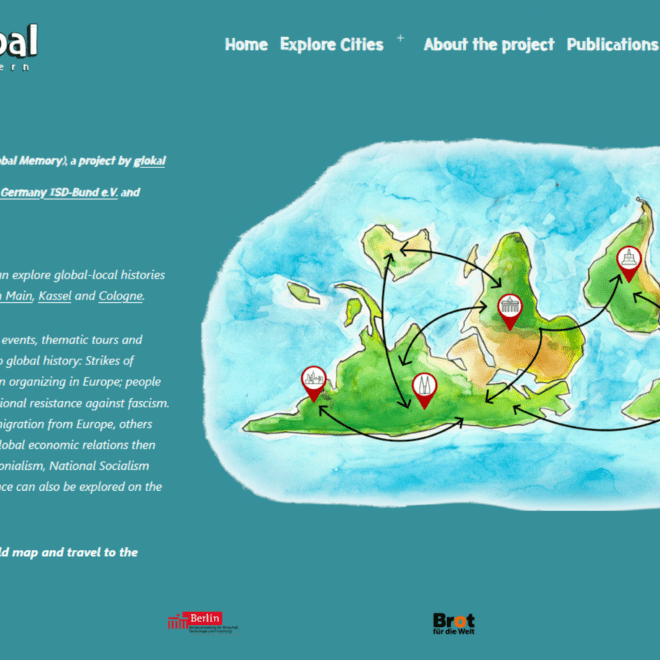
About the project
In every city, there are historical events, thematic city tours, and individuals connected to global history: Strikes by migrant workers; sites of African organization in Europe; people who were actively involved in international resistance against fascism. Some places were central to emigration from Europe, while others played and continue to play a significant role in global economic relations. Traces of German colonialism, Nazism, and far-right violence can also be traced on the maps.
History, as it is written, narrated, remembered, and taught, usually stops at national borders. But the history of the German state and its inhabitants is much more than that. On one hand, Germany has strived for influence far beyond its national borders: the exploitation of gold, silver, and labor on other continents, the pursuit of colonies, living space, and ever-new markets for German products. On the other hand, a large part of the population brings global stories with them: international family connections, immigration experiences, or refugee stories. They have friends in various corners of the globe or have been active there. Many of these global stories are intertwined with places, events, individuals, institutions, or companies in Germany.
Such a globally connected history and present is rarely considered when it comes to history, memory, and current globally relevant issues in Germany. That’s why we want to record an archive of such historical and current connections between the Global South, North, East, and West on the Global Erinnern (Global Remembering) map and continue researching and filling the map in many directions together with different people. Our goal is to contribute to a multidirectional, global memory from a decolonial perspective and thus create new, more inclusive perspectives on our current life. In this process, stories of domination, oppression, trauma, and resistance do not compete with each other but meet in solidarity and empathy.
We address students, young and older adults, multipliers, museum staff, and the wider public with the project. Because examples of global connections and stories, such as those of oppression and resistance, can be found in many places! However, these stories are often not written down, their global connections are not remembered, and they need to be ‘unearthed.’
The main measure of the project from 2020 to 2022 was the development of a digital map in Berlin, Bremen, Frankfurt, Kassel, and Cologne in collaboration with local groups and researchers. This map, through thematic tours, events, and biographies, reveals local-global connections in five cities and thus promotes the perception of international solidarity through shared global history. Components of the project include educational measures and the further development and translation of existing global history materials, such as the eLearning tool ‘connecting the dots. History(ies) of Oppression and Resistance.’ The first project cycle lasted from May 2020 to the end of December 2022. In the second project cycle from 2023 to 2024, we aim to expand the map to new cities and conduct even more educational work based on this foundation.
The project is funded by Engagement Global with financial support from the BMZ (Federal Ministry for Economic Cooperation and Development), as well as from the budget of the State of Berlin – State Office for Development Cooperation, and from Brot für die Welt, and is supported by the One World Promoter Tahir Della.
Global Erinnern is integrated into the development education work of glokal e.V. and is a collaborative project with the Initiative Schwarze Menschen in Deutschland ISD-Bund e.V. and recherche international e.V. Additionally, the project is supported by Tahir Della, a One World Promoter for diasporic perspectives in development education work in Berlin. The project was initiated by our colleague Doğan Akhanlı, who passed away in 2021. Doğan, as a writer and activist, campaigned for the enforcement of human rights and the creation of a transnational memory space.
Our Recommendation
The digital map is suitable for diverse use in memorials, schools, and extracurricular learning locations, both in-person and digitally. The material is user-friendly, activating, and has low entry barriers, making it accessible to learners with varying levels of knowledge and language proficiency.

